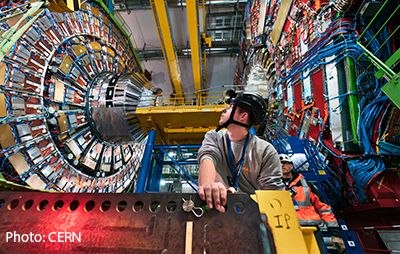
The Compact Muon Solenoid (CMS) experiment explores particle interactions at the highest controlled energies at the Large Hadron Collider at CERN. CMS has over 4000 particle physicists, engineers, computer scientists, technicians and students from around 200 institutes and universities from more than 40 countries.
Scientists from around the world have used the data collected from the CMS detector to discover the Higgs boson in 2012, which had been sought for almost half a century, leading to the Nobel Prize in Physics in 2013. CMS is now searching for dark matter and other new phenomena, as well as measuring the detailed properties of previously discovered particles with unprecedented precision.
CMS Computing at Fermilab provides the computing and analysis capabilities that allow CMS scientists to make discoveries like the Higgs boson. Fermilab Computing has built and operates the largest CMS Tier-1 computing center in the world. It is mission critical to the CMS experiment and provides analysis capabilities to the LHC Physics Center at Fermilab and to U.S. universities involved in the experiment.
CMS Computing at Fermilab provides state of the art computing, networking, and storage solutions to tackle the challenge of the massive data transfer, data archiving, and data processing required by CMS. Equally important to CMS is Fermilab’s ongoing leadership within CMS computing and software. Fermilab is active in both operations and development within the areas of data access, framework, infrastructure, physics generation, detector simulation and event reconstruction.
More Information: USCMS, CMS Experiment
